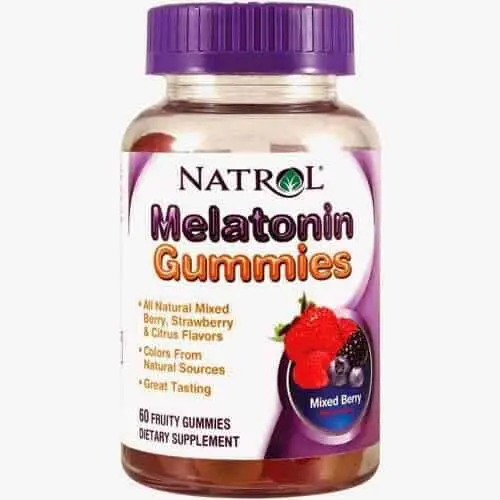Wouldn’t it be wonderful if all parents had a simple little pill they could just give their kids, and they’d fall sound asleep? Bring up that you’re having trouble getting your child asleep, and you may be suggested just that, a pill. Melatonin supplements are non-prescription and can be found in just about any department store in the nation for under 10 bucks. As they gain popularity among parents, you have to wonder, if it sounds too good to be true, it usually is isn’t it? Is melatonin safe for kids?
What is melatonin?
Melatonin is a hormone produced in the brain that regulates sleep cycles. Influenced by light levels, it helps your body know when to sleep, and when to wake up.
How are melatonin supplements made?
Melatonin supplements are often synthetic, meaning they’re made in a lab. However, natural versions are also available extracted from the pineal glands of animals (less common) or, more recently, also from plant sources.
Does melatonin work?
Studies are actually conflicting on that point, but current research shows promising support for melatonin being effective at helping kids fall asleep earlier and sleep slightly longer. It may also be helpful for jetlag, insomnia, delayed-sleep wake phase, sleep disruption disorders, and sleep disorders associated with ADHD and autism.
What are the known short term risks of melatonin use?
Even melatonin in appropriate doses for occasional use is shown to cause adverse reactions in some users including:
–Daytime drowsiness or fatigue
-Headache
-Sleep walking
-Dizziness
–Irritability
-Depression or mood swings
-Abdominal pain or cramping
-Nausea or digestional upset
-Severe nightmares or vivid dreams
-Hormonal disruption
These reactions naturally occur at a higher frequency with higher doses or more regular use.
What are the known long-term risks of melatonin use?
Studies on the long-term effects of melatonin use in humans haven’t even been done. Caution is generally suggested as a result.
Does melatonin have different effects on children?
Some studies done on animals found that when given melatonin at a young age overall life span was decreased. There have been short term, small-group studies done on autistic and blind children who have irregular naturally-occurring melatonin levels that did not show adverse effects other than those outlined above. Most of these studies were done on teens. No studies have been done on children with regular melatonin levels, or toddlers and infants.
In either case, no long-term studies have been done on the effects of melatonin on children to determine if melatonin is safe for kids. Almost all pediatricians do not recommend melatonin for children under 3. Most pediatricians do not recommend melatonin for kids under 10. In all cases, despite melatonin being an over-the-counter dietary supplement a doctor should be consulted if you are considering medicating your child with melatonin.
So, is melatonin safe for kids?
That’s the big question. Personally, a glance at the possible short-term side effects of melatonin use would cause me as a parent to not use melatonin or suggest its use to other parents, no matter how tired those parents may be. The exclusion there would be in children with actual sleep disorders. Many children that don’t go to sleep when their parents want don’t have sleep disorders though, making melatonin supplementation an unnecessary medication. However, that is an opinion-based answer.
Factually, there has not been sufficient research to answer the question is melatonin safe for kids. The question for parents then is, does not knowing for sure if melatonin is unsafe for kids make melatonin safe for kids?
If you chose to use melatonin for kids, what’s the proper dosage and usage?
Melatonin dosage guidelines for children have not been determined in the US, but according to the Canadian Paediatric Society general melatonin dosage recommendations for children with sleep disorders are as follows:
-1 mg of melatonin in infants
-2.5 to 3 mg in older children
-5 mg in adolescents.
Again, any dosage and melatonin use in kids should be discussed with a licensed health professional. These guidelines are not designed for children without sleep disorders.
Melatonin should be given 30 to 60 minutes before bedtime, rather than right before bed.
What might you try instead of melatonin for kids?
Natural food sources of melatonin:
If you’re looking to supplement melatonin without using a pill, the good news is many foods contain melatonin.
Some foods high in melatonin include:
-tart cherries
-corn
-asparagus
-tomatoes
-peppers
-pomegranate
-olives
-grapes
-strawberries
-broccoli
-cucumber
-rice
-barley
-rolled oats
-walnuts
-peanuts
-sunflower seeds
-mustard seeds
-flaxseed
-mushrooms
-eggs
-fish
Choosing these foods for dinner ingredients, snacks, or desserts in the evening may help raise melatonin levels.
Altering light exposure:
Finally, you can naturally increase melatonin levels by altering your child’s exposure to light and dark. Some ways to do this include:
-Avoid screen-time within an hour of bed time.
-Turn out the lights and use blackout curtains about an hour before bed.
-Use daylight bulbs and open your curtains during the day.
-Do plenty of outdoor activities during the day.
What are your thoughts? Is melatonin safe for kids? Do you use it? Why or why not? We’d love to hear your thoughts.
You might also enjoy our pages on helping kids get to bed and making getting kids up in the morning easier.

